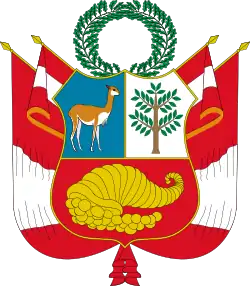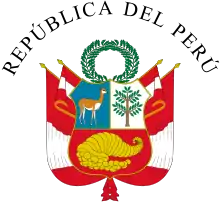Peruvian nationality law
According to the Peruvian Constitution and nationality legislation passed in 1996 as well as an executive order declared in 1997, Peruvian nationality can be passed by birth via jus soli or by registration if born overseas and duly registered at a Peruvian embassy or consulate before the child reaches 18 years of age. As of March 2018, children born abroad to Peruvian parents are now able to register as Peruvian citizens even if they were not registered before age 18 (see next paragraph). In addition, infants or minor children found abandoned on Peruvian territory are assumed to be Peruvian citizens. This is consistent with the nationality law of most countries of the Americas. In 1992, Peru had a scheme of selling citizenship to foreign investors for USD25,000. The scheme was closed the year after due to public outrage.[1]
| Peruvian Citizenship Act | |
|---|---|
 | |
| Parliament of Peru | |
| |
| Enacted by | Government of Peru |
| Status: Current legislation | |
Beginning in March 2018, those children born overseas to Peruvian mothers or fathers who were not registered before reaching 18 years of age can now also acquire Peruvian nationality by applying at their local consular office abroad, under an amendment to Article 52 of the Peruvian Constitution.[2]
Foreigners can also acquire Peruvian nationality, including:
- Minor children born overseas to foreign parents who, having lived in the territory of the republic since five years of age, can elect to acquire Peruvian nationality at 18 years of age by applying to the nearest Peruvian consulate or embassy in their own country
- Foreigners married to Peruvian spouses may acquire Peruvian nationality after two years of marriage and domicile in Peru.
Dual or Multiple Nationality
 |
|---|
| This article is part of a series on the politics and government of Peru |
| Constitution |
|
|
In common with many other Ibero-American countries, Peru's 1993 constitution explicitly states that nationals of Latin American countries and Spain do not lose their nationality upon acquiring Peruvian citizenship (many Latin American countries and Spain have similar reciprocal laws). In practice, multiple citizenship is acknowledged and accepted by Peru and its consular and diplomatic staff.
Naturalization
A person who has two years of legal residency in Peru, be it by marriage or other reasons such as work, can apply for naturalization. The two year requirement starts from the date one acquires residency in the country, provided that residency never lapses. The years must be consecutive. If a person has a work visa that expires, and renews it later, it doesn't count as two consecutive years. The renewal must happen before the expiration of the first. For married people, simply staying in the country is sufficient.[3]
The person does not lose their previous citizenship; no letter of resignation of it is required, unless acquiring citizenship in Peru would conflict with the former country's laws, such as for Japanese citizens.
See also
References
- LEY DE REFORMA DEL ARTÍCULO 52º DE LA CONSTITUCIÓN POLÍTICA DEL PERÚ, retrieved July 30, 2020
- "PERU CITIZENSHIP SELLS FOR $25,000". The New York Times. Retrieved 2012-04-18.